I think this activity was a really great way to introduce a lot of new technology, and show just how much the internet has to offer.
There were some really great tools, a lot I had used before and a lot I hadn't, and all of them were pretty interesting to explore.
Not only can a lot of these things be used by librarians in their jobs, but are great tools to introduce to library users, and improve service.
As someone interested in academic libraries, I found a lot of these really interesting. Several of these tools would be very useful to college students doing research, as well as being extremely easy for them to use. College-age students today are very technologically savvy, but probably don't know how to use it to make it work for them school-wise, and probably wouldn't know about some of these things, but a librarian could introduce them to it.
I think that libraries must move forward with technology and internet, and in order to do so, librarians must know how to use all sorts of web 2.0 tools, and how to utilize it in order to give their patrons the best services possible. While the 23 things certainly don't cover everything that the internet has to offer librarians, they are still extremely helpful in giving an introduction to the web, and are a great starting point in terms of the wide array of things that the internet can offer a librarian.
Thursday, November 11, 2010
Web 2.0 Tools
Perhaps this is sort of cheating, but one of the websites that stuck out to me was last.fm.
I’ve had an account for years, and I don’t even use the site to full potential but I love it. I like knowing useless facts like how many songs I’ve listened to in the past 2 years, how many times I’ve listened to an artist or song, etc. One of the useful things too is it will recommend you other artists that aren’t already in your library, based on your top listens, and you can also see users who listen to artists, and friend them and talk to them. You can comment on songs, rate songs, etc.
Basically, last.fm is like a goodreads or librarything, but for music. It also incorporates some wiki-like functions, as each artist’s page can contain information about the artist and pictures, uploaded by users, and you can see the artists’ discography and songs, and some artists even offer free downloads on the site.
I’m not sure how last.fm could really be applied to libraries, because similar things do exist for books, but I just think that last.fm is a great tool that has introduced me to many new artists, and fulfills my need to know useless statistics. :)
Library 2.0
I think the idea behind ‘library 2.0’ is one which will help to sustain libraries into the future. Though libraries and archives are an important link to the past, and in no way should abandon books and personal service, I think integrating new technology is essential.
As society moves forward, so must libraries. By offering things like audiobooks and downloads, for instance, libraries are able to meet changing user needs. More internet-based information is essential, because the way people search for information is quickly becoming solely internet/computer based. Although certainly a lot of the older generations are unable to keep up with this changing technology, the changes must happen in stages, not all at once, and therefore by the time that computer and internet skills are essential for library use, more of the population will be competent to use them.
I would in no way advocate making physical libraries and librarians obsolete, and I don’t think that an extreme change is necessary in the near future. But its undeniable that all aspects of society are becoming technologically based, and libraries must follow suit, because their users expect library services to change in the same ways.
Wednesday, November 10, 2010
Rollyo & Zotero
This was an interesting site, and one which I had never heard of before.
After playing around, I created one based around Agatha Christie, and connected it to several book sites, as well as Wikipedia and the official Christie site. It was interesting to search her books and characters, even obscure ones – although Wikipedia came up most often, and with that came a lot of other Wikipedia items with similar names, unfortunately.
I could see a librarian using it to create a search for students using only relevant, reputable sites to help with research, but it would be on a pretty small scale I’d think. A very interesting and useful website.
My first problem with zotero is that it isn’t compatible with Chrome – I downloaded Firefox just to complete this portion of 23 Things, which was not what I wanted to do, so immediately I was a bit biased against zotero.
I’m still not sure I completely understand Zotero’s point, or how to use it. I was a bit confused by the whole thing, and I think it involves too many complicated directions to be able to use effectively without spending time getting used to it.
From what I can tell, it would definitely be useful in the field, especially in helping researchers, but it would take a lot of patience. Perhaps I’m just not used to not understanding something about the internet immediately, but zotero frustrated me and made me want to give up before understanding it properly.
LibraryThing
While there are some good things about LibraryThing, overall I wasn’t a fan.
I’ve had a goodreads account for a while now, and overall I prefer that site. There are a lot of useful features to LibraryThing though, and more in terms of finding similar users. However, I found it very hard to find the book I was looking for compared to goodreads, particularly because under one book on goodreads you can see all the other editions of the same book, unlike on librarything, as far as I can tell. It’s a bit time-consuming to find the exact book you’re looking for without the isbn, and while the ability to search so many different catalogs of information, like amazon and Library of Congress is nice, it’s also a bit of a hassle to work with.
One other thing that I didn’t see on LibraryThing that I use/abuse on goodreads is the ability to update what page of a book you’re currently reading. I like tracking how long it takes me to read a book, and sharing where I am with my friends on goodreads.
Regardless of what site you use though, I like that these kinds of sites exist. Similar to what I was saying regarding book review wikis, I love being able to read reviews before I read a book, and add my own review, as well as having a handy way of tracking what books I’ve read for my own personal reference, and how many I’ve read.
Tuesday, November 9, 2010
Web-based apps & Google
Though I’d heard of Google Docs before, I didn’t actually use it until this semester. Man, I was missing out!
One thing that was always a huge hassle in undergrad was when I’d do research on school computers, or when my laptop was broken and being fixed in UB Micro (at least once a year…) and I had to use the school computers, was saving files and saving links. I always ended up saving multiple word docs of links to pages to remember, or citations to remember, or articles, or outlines & beginnings of essays, and it was a mess to save them in a way I could retrieve them on a different computer later. I was constantly losing my thumb drive, and so always ended up emailing multiple docs as attachments between email accounts. WHY didn’t I check out google docs then? Being able to have all those things saved into one place that I could access from anywhere would have been so much more convenient!
I’ve slowly been realizing how great Google is. Once I tried gmail, yahoo mail was forever in the past. iGoogle has been my homepage for well over a year now, cluttered with gadgets I rarely look at and some I use every day. Google Earth is a great way to waste time. Google Chrome has been a revelation since I got my new laptop and it was the default browser – I liked Firefox just fine on my last computer, but haven’t even bothered to download it on this one after using Chrome.
After looking at the list, I realized just how much I still didn’t know existed. I tried out the calendar and books.
I had no idea all of these books were available to read online! I can see myself using this a lot, despite the fact that reading for too long on a computer screen will probably make my eyes hate me. Even though I don’t yet have one, I’ve been looking into a Nook or Kindle for Christmas, and I’d be interested if with the download feature, if the pdf you can download will work with the Nook, which my roommates who each have one tell me you can put pdf files on them.
The calendar, to be honest, was useful but wasn’t perfect for me. It took a little bit of getting used to, and, to be superficial about it, I couldn’t find a way to make it pretty enough. Although some would find the alert function of it useful, if I didn’t have a blackberry and it emailed me an alert, I might not get it for hours. As it is, if I really need to remember something, I can put it in my BB’s calendar, and not have to wait for an email. Very functional, but not something I would use myself. Google certainly continues to amaze though, and I look forward to checking out more of the apps on the list.
Wikis
I use Wikipedia on a near daily basis for a variety of reasons, but it actually took me a while to realize that Wikipedia was just one example of a wiki, and what exactly they could be used for. I also have had experience with pop-culture based wikis, for instance, there’s one for the Harry Potter universe, with entries about every character, actor, book, event, object, etc that its users can think of.
While I like the idea of a wiki a lot, I do realize (especially if I was a librarian instructing students) how dangerous it is to believe everything you read on Wikipedia and similar wikis, because it is edited by people who don’t always list their sources, and anyone can change it at a moment’s notice.
After learning more about wikis, I see the variety of functions and uses, which are all pretty great.
One of the example son the 23 things website I liked was the Princeton Public Library’s Book Lovers wiki. I LOVE the idea of a wiki based around people reviewing books. It’s kind of a shame that the site as is now seems pretty limited, and I wonder what a site like this could become if it was on a larger scale, with less moderation of who could post. Websites like Amazon and Goodreads are great places to read book reviews already, so I wonder exactly how popular/useful a wiki of people posting book reviews would be. It would have to be set up differently, so that for each book multiple people could upload their own reviews, but to then have people be able to search by review, as this site does with looking for only 5 star book reviews, which I found to be a great feature, would be great. To have people tag the books themselves as well, with both rating, what they think an appropriate age group would be, etc would be great. I also think it would be interesting if in a wiki you could see a book’s page and reviews, and be able to then have links from it to similar authors/books/plot genre, etc. While all of these features are available in a multitude of websites, I’d be really intrigued if all of these could be combined into one website.
Technorati
Technorati has officially become a new time-waster. One of my favorite things is finding new blogs, particularly pop culture & humorous ones, and there’s a lot to choose from.
I checked out the top 100 blogs, and what surprised me was how many of them I would not have considered to be a ‘blog.’ Huffington Post is number one, and while it’s not what I would consider an unbiased or real ‘news’ site, I would not have pinpointed it as a blog. Same as tmz.com – it feels like a ‘news’ site all its own, not a blog, which I’ve always thought of as something done by one or more people who are there to express thoughts, spread humor, or share their opinions, and while a lot of blogs I read do make their writers money, I have never thought of a blog as being an enterprise. Its interesting to think really about how to categorize websites, because a lot of sites don’t fit into distinct categories.
I’ve visited quite a few of the blogs on the top 100 list, and so I went to go search the tags of Technorati. I found some interesting stuff under history, and though a lot would be useful to introduce to history students, I don’t know if technorati tags would be a good way to tell them to find such sites. A lot of stuff obviously isn’t academic, and some links went to things with “history” in the title but which didn’t actually involve history.
Delicious
Delicious is a site I’ve heard about before, but never really tried for myself. The video was certainly in-depth and helpful!
On a personal level, I think this is a really useful too, for both saving bookmarks I like so I can access them from any computer without having to remember URL’s or having to search for them on google, and I think the possibility for sharing even just fun frivolous stuff between friends using the site is really neat.
I also see a huge advantage with it in terms of use in a library setting, particularly with research. I have an interest in academic libraries, and I could see myself using this site if, for instance, I was a subject librarian and was instructing history students on how to research. Not only could I use it to save & bring up websites to show them, or recommend that they use it to save links that they will need to cite later, etc., but it would be great to be able to post a link to a delicious account on the library’s website of history sites and news in the field to share with students looking for information. There are lots of great uses for a site like this both in and out of the field, making the internet easier to use and helping people get more out of the internet.
On a personal level, I think this is a really useful too, for both saving bookmarks I like so I can access them from any computer without having to remember URL’s or having to search for them on google, and I think the possibility for sharing even just fun frivolous stuff between friends using the site is really neat.
I also see a huge advantage with it in terms of use in a library setting, particularly with research. I have an interest in academic libraries, and I could see myself using this site if, for instance, I was a subject librarian and was instructing history students on how to research. Not only could I use it to save & bring up websites to show them, or recommend that they use it to save links that they will need to cite later, etc., but it would be great to be able to post a link to a delicious account on the library’s website of history sites and news in the field to share with students looking for information. There are lots of great uses for a site like this both in and out of the field, making the internet easier to use and helping people get more out of the internet.
RSS Feeds/Finding Feeds
I’ll be honest, I’ve seen the little orange icon and read RSS feeds mentioned on countless websites for years, but I never really understood it and never tried to.
Its actually kind of awesome.
I set up a google reader linked to my google account, and went to some of my daily websites actually looking for the orange square for once. Its actually really neat that every time one of the blogs or daily sites I check on a daily basis can all be found in one page now. Instead of remembering to go to each site daily using my bookmarks folder, I can read them all right in one place. I can’t believe I didn’t investigate this sooner to be honest.
And though I’d heard of technorati.com, I’d never actually gone there before, found some great links.
While these two of the 23 Things were very interesting, they certainly don’t help with being productive with schoolwork. As if I needed an easier way to waste even more time on the internet!
Its actually kind of awesome.
I set up a google reader linked to my google account, and went to some of my daily websites actually looking for the orange square for once. Its actually really neat that every time one of the blogs or daily sites I check on a daily basis can all be found in one page now. Instead of remembering to go to each site daily using my bookmarks folder, I can read them all right in one place. I can’t believe I didn’t investigate this sooner to be honest.
And though I’d heard of technorati.com, I’d never actually gone there before, found some great links.
While these two of the 23 Things were very interesting, they certainly don’t help with being productive with schoolwork. As if I needed an easier way to waste even more time on the internet!
podcasts & audiobooks
While I have some experience with podcasts, I had never been to any of these sites before. The podcasts I have listened to I’ve found out about after they had already stopped being updated, ones from my favorite comedians that I found available for download in other places. I love the idea of a podcast, and I was surprised at the variety. From arts & crafts to music, and even major channels create podcasts from their content, such as BBC Radio 1, which I enjoy but often miss the best DJs because of the time difference. I definitely see the use of podcasts in the library & information field, from instructing library users to sharing what is going on within the library community.
I also have downloaded audiobooks in the past from several sources, as well as burning them from cds from the library. I walk & take public transport to work, and am easily motion sick, so audiobooks on my ipod are a great way to keep entertained, and read the books on my reading list.
One thing that the BECPL, as well as my hometown library system, Monroe County’s, I found out recently, does is to make audiobooks available to download online, which is extremely convenient, and the files delete themselves on the “due date”, so there are no late fees either! Very handy, not the best selection yet but it’s interesting to see how the libraries are moving with the technological times.
I had no idea librivox existed though, and am so glad for this new resource! Although perhaps there’s not the greatest selection in only public domain books, and the recordings I listened to were not as well produced or read as other audiobooks, considering the ease of downloading and that its free, this is a great resource.
I also have downloaded audiobooks in the past from several sources, as well as burning them from cds from the library. I walk & take public transport to work, and am easily motion sick, so audiobooks on my ipod are a great way to keep entertained, and read the books on my reading list.
One thing that the BECPL, as well as my hometown library system, Monroe County’s, I found out recently, does is to make audiobooks available to download online, which is extremely convenient, and the files delete themselves on the “due date”, so there are no late fees either! Very handy, not the best selection yet but it’s interesting to see how the libraries are moving with the technological times.
I had no idea librivox existed though, and am so glad for this new resource! Although perhaps there’s not the greatest selection in only public domain books, and the recordings I listened to were not as well produced or read as other audiobooks, considering the ease of downloading and that its free, this is a great resource.
Monday, November 8, 2010
youtube
I use youtube already on a daily basis, for a variety of reasons. Its a great time-waster, as well as having lots of useful instructional videos for everything from computer programs to crafting to makeup.
One of the ways I use youtube most often, to be honest, is to watch tv shows. I've found several shows from my childhood uploaded, which aren't available on DVD, and its great to walk down memory lane. But largely the tv shows I watch on youtube are British shows which aren't available in America - but (pretty much always illegally probably) British users will upload whole shows very shortly after an episode airs in the UK, and it makes it so easy to follow other programs than what's on American tv.
But in addition to users illicitly uploading, a lot of shows and tv channels will have thier own account, and upload great high quality snippets from shows, in order to boost interest and introduce viewers to characters & storylines.
While I can't watch anything on the actual BBC youtube channel, because it is for UK viewers/ip addresses only, BBC has set up a separate account, BBCWorldwide, which I find really interesting. They've uploaded hundreds of videos from hundreds of episodes of so many of their most notable shows, for instance, the Doctor Who clip below, as well as lots from much older and perhaps more obscure shows, like A Bit of Fry & Laurie, also below
Doctor Who
A Bit of Fry & Laurie
I think that this is an excellent example of what youtube offers any company, be it a library or library system, a business, a tv network, or even just one person - the chance to expose themselves to the world, and share whatever they wish.
One of the ways I use youtube most often, to be honest, is to watch tv shows. I've found several shows from my childhood uploaded, which aren't available on DVD, and its great to walk down memory lane. But largely the tv shows I watch on youtube are British shows which aren't available in America - but (pretty much always illegally probably) British users will upload whole shows very shortly after an episode airs in the UK, and it makes it so easy to follow other programs than what's on American tv.
But in addition to users illicitly uploading, a lot of shows and tv channels will have thier own account, and upload great high quality snippets from shows, in order to boost interest and introduce viewers to characters & storylines.
While I can't watch anything on the actual BBC youtube channel, because it is for UK viewers/ip addresses only, BBC has set up a separate account, BBCWorldwide, which I find really interesting. They've uploaded hundreds of videos from hundreds of episodes of so many of their most notable shows, for instance, the Doctor Who clip below, as well as lots from much older and perhaps more obscure shows, like A Bit of Fry & Laurie, also below
Doctor Who
A Bit of Fry & Laurie
I think that this is an excellent example of what youtube offers any company, be it a library or library system, a business, a tv network, or even just one person - the chance to expose themselves to the world, and share whatever they wish.
Saturday, September 18, 2010
Flickr
I've encounter flickr often on the internet, and followed specific links to it, but never taken the time to explore it. While its not entirely different than other photohosting sites I've been to and used in the past, it certainly offers a lot more, and also seems to take a bit more time to completely understand how to use. There's some amazing stuff on it though, and I can easily see myself both using it and spending hours looking through other people's photos. The mashup stuff was interesting to check out too. I spent ages looking through all the letters it could gave me, haha.
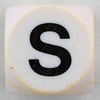


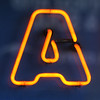
![U\]()
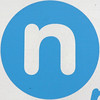
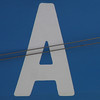
What I found most fascinating, while taking the "tour" the site offers, was what they call The Commons - images from many archives & collections. I spent a lot of time exploring this, as a lot of pictures I found by exploring different tags there is the kind stuff that I can spend hours looking at.
I even found my previous employer's, the George Eastman House, has an account, with over 900 photos from the collections. Every day at work, when I brought up the browser on the computers there, the home page was the main website, and I know I've seen the flickr logo on there before, but never bothered to click it.
This is actually fantastic that they've done that, because, although its obviously nothing like seeing a print in person, making even a small part of the Eastman House's massive collection available to view by anyone is a great thing. I know from experience, three summers of working at the admissions desk, that what so many people want is to be able to see stuff in the archives that there is never physical room for in the ever-changing exhibition galleries. I don't know if the museum's flickr was around the last time I worked the desk over a year ago, but if it was, I wish I had been made specifically aware. I could have had so many people walk away from my desk with even more satisfaction than their visit had already given them, instead of telling them that pictures in the archives were not accessible by the public.
Flickr obviously serves many purposes, and serves them well, but this was one aspect I was particularly fascinated by, and pleased by. I think this is an amazing way of collections & museums to share their treasures with the world, and another reason why the internet is actually such a great thing.
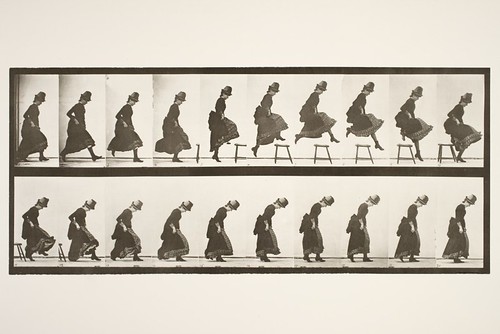
('Jumping; running straight high jump' by Edward Muybridge, from the collection of George Eastman House on Flickr)






What I found most fascinating, while taking the "tour" the site offers, was what they call The Commons - images from many archives & collections. I spent a lot of time exploring this, as a lot of pictures I found by exploring different tags there is the kind stuff that I can spend hours looking at.
I even found my previous employer's, the George Eastman House, has an account, with over 900 photos from the collections. Every day at work, when I brought up the browser on the computers there, the home page was the main website, and I know I've seen the flickr logo on there before, but never bothered to click it.
This is actually fantastic that they've done that, because, although its obviously nothing like seeing a print in person, making even a small part of the Eastman House's massive collection available to view by anyone is a great thing. I know from experience, three summers of working at the admissions desk, that what so many people want is to be able to see stuff in the archives that there is never physical room for in the ever-changing exhibition galleries. I don't know if the museum's flickr was around the last time I worked the desk over a year ago, but if it was, I wish I had been made specifically aware. I could have had so many people walk away from my desk with even more satisfaction than their visit had already given them, instead of telling them that pictures in the archives were not accessible by the public.
Flickr obviously serves many purposes, and serves them well, but this was one aspect I was particularly fascinated by, and pleased by. I think this is an amazing way of collections & museums to share their treasures with the world, and another reason why the internet is actually such a great thing.

('Jumping; running straight high jump' by Edward Muybridge, from the collection of George Eastman House on Flickr)
7 1/2 Habits
Though its obvious we are constantly learning on a daily basis, its interesting to really think about the extent to which everyone is, in fact, a lifelong learner. Whether it be in school, on the job, or even watching a documentary on TV, I can't imagine a day doesn't go by that in this modern world, in which we are always interacting with others or receiving information through tv or computer, we learn something new.
Especially in a field where technology is constantly changing and expanding, being able to learn successfully is vital. While most of the "habits" were kind of common sense once you think about it, its helpful to see them laid out and gone over.
I think the easiest habit, one I do already, is the second, "accept responsibility for your own learning." I never would have made it through college with the grades I did if I didn't take responsibility for making sure I understood what was being taught, and what the assignments were, as well as for completing readings and assignments which further taught what the professor might not have expressly told us in a lecture. I do this every day at work as well, where I'm still in the training period, by making sure that if I have a question or am unsure of something, I ask immediately, and therefore take the responsibility of learning everything I can.
The hardest habit is probably the third, to see problems as challenges instead. While I certainly don't like to give up on things or quit when it gets tough, its hard for me to not get upset when a problem presents itself. In undergrad, though I would work hard to figure out the answer to the problem, I definitely stressed out a lot more than was probably helpful when I came up against a problem while working on a paper or assignment. I have a tendency to overreact when something goes wrong, but by trying harder to view a problem as a challenge to be solved, perhaps I can limit this, and thereby learn more effectively. As well as hopefully avoid taking a few years off my life from having nervous breakdowns.
Subscribe to:
Posts (Atom)
